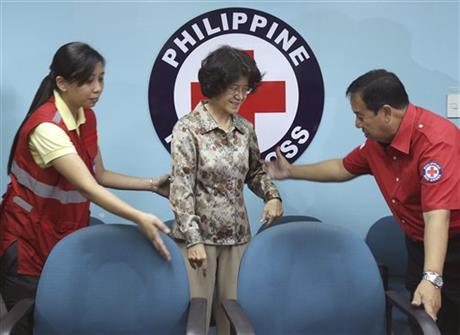
By JIM GOMEZ
Philippine Red Cross Chairman Richard Gordon, right, welcomes Chinese Ambassador Ma Keqing, center, before turnover rites of payloaders donated by Chinese companies in Manila, Philippines on Monday, Dec. 2, 2013. China’s envoy to the Philippines says it is the sovereign right of her country to establish a new maritime air defense zone over the East China Sea and replicate the move over another disputed region. (AP Photo/Aaron Favila)
Philippines China Airspace
Chinese Ambassador Ma Keqing gestures as she answers questions from reporters at Philippine Red Cross headquarters in Manila, Philippines on Monday, Dec. 2, 2013. Ma said it is the sovereign right of her country to establish a new maritime air defense zone over the East China Sea and replicate the move over another disputed region. (AP Photo/Aaron Favila)
Philippines China Airspace
Philippine Red Cross Chairman Richard Gordon, right, shakes hands with Chinese Ambassador Ma Keqing as they pose for photographers during turnover rites of payloaders donated by Chinese companies in Manila, Philippines on Monday, Dec. 2, 2013. Ma says it is the sovereign right of her country to establish a new maritime air defense zone over the East China Sea and replicate the move over another disputed region. (AP Photo/Aaron Favila)
Prev 1 of 3 Next
MANILA, Philippines (AP) — China has a sovereign right to establish a maritime air defense zone over another region as it did in the East China Sea, the Chinese envoy to the Philippines said Monday.
The United States and key Asian allies have not honored the East China Sea zone, which was announced on Nov. 23 and is seen primarily as a bid to bolster China’s claim over uninhabited Japanese-controlled islands known as Senkaku in Japan and Diaoyu in China. The Philippines is locked in a long territorial dispute with China in the South China Sea.
When asked to comment about concerns that China might set up a similar zone over the South China Sea, Ambassador Ma Keqing said in a news conference that it was within the right of the Chinese government to decide “where and when to set up the new air identification zone.”
But she added she could not tell at this time if China would do so.
Ma said that the East China Sea zone’s designation should not spark concerns.
“I think the target is not to trigger a conflict but to prevent, to pre-empt any tension to be raised in these areas,” Ma said. “This will not hinder any normal freedom of flights within this area if they’ve notified the Chinese authorities.”
The new U.S. ambassador to Manila, Philip Goldberg, described China’s move as dangerous.
“We do not believe that this is a move intended to build confidence or, in any other way, improve the situation,” Goldberg told reporters.
Instead, China’s new zone “will create tension and the possibility of miscalculations and that’s never good, especially in an area where we know that, whether it’s over the Senkakus or … the South China Sea.”
While the U.S. has not recognized the Chinese imposition, it has advised its carriers to comply to be safe.
“We can’t, with commercial aircraft, take chances, as I mentioned, of miscalculation, so we have recommended to our commercial airlines that they give such notification,” Goldberg said.
China has said that all aircraft entering the zone of international waters between China, Taiwan, South Korea and Japan must notify Chinese authorities beforehand and that it would take unspecified defensive measures against those that don’t comply.
China has been locked over increasingly-tense disputes over potentially oil- and gas-rich territories in the South China Sea with Brunei, Malaysia, the Philippines, Taiwan and Vietnam.
While recent territorial spats between Beijing and Manila have particularly been antagonistic, China has extended help to the Philippines, which was devastated by a Nov. 8 typhoon that left more than 5,600 people dead and 1,700 others missing.
Ma witnessed the turnover in Manila of three new payloaders donated Monday by Chinese companies to the Philippine Red Cross for clearing debris and rebuilding homes in the worst-hit central city of Tacloban.
“This typhoon provided an opportunity for the Chinese people to help the Philippine people, to show the traditional friendship between the two countries,” Ma said. “This strong bond will live on despite all the differences we have.”



